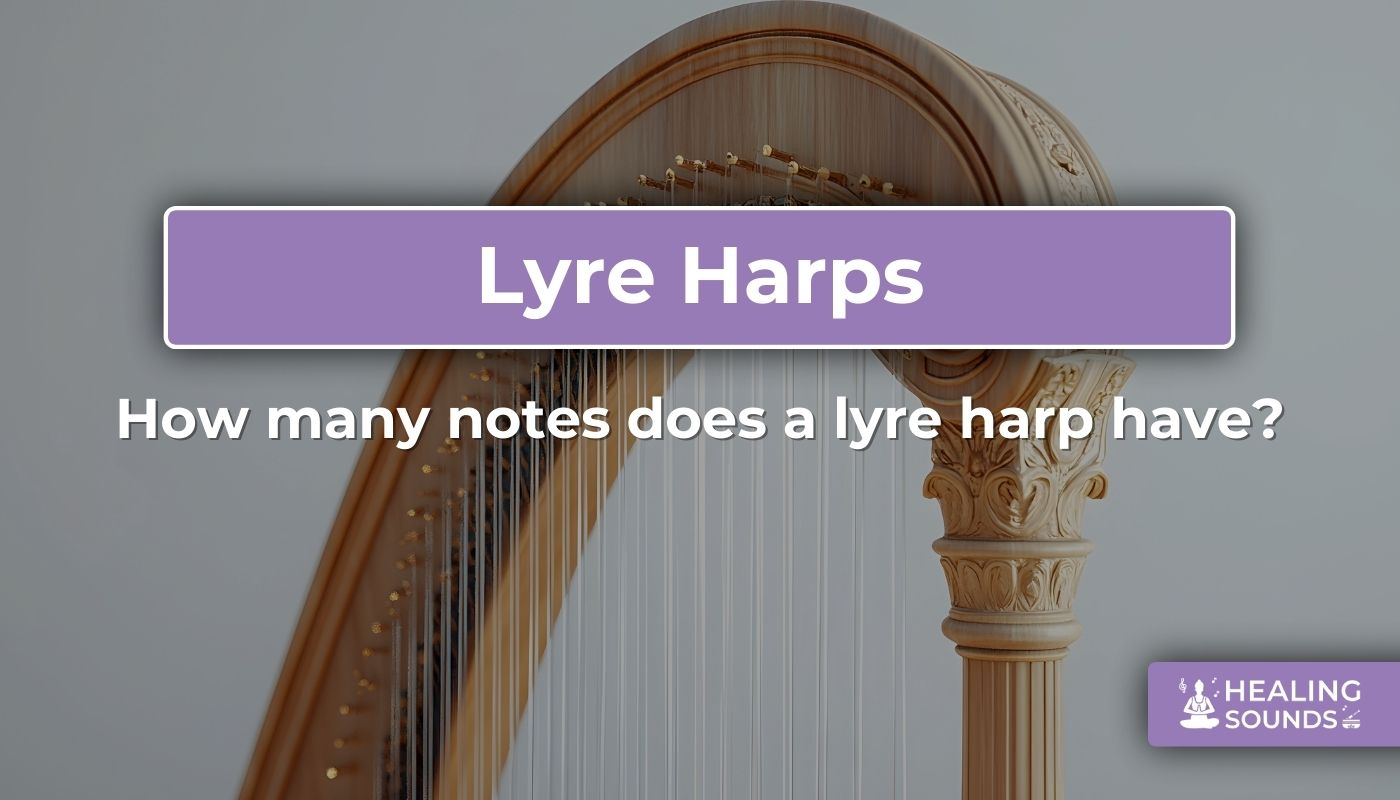The enchanting sound of the lyre harp evokes images of ancient myths and tranquil melodies. As a music enthusiast intrigued by this timeless stringed instrument, you might be wondering: exactly how many notes for a lyre harp are possible? Understanding the musical range of a lyre is key whether you're a beginner exploring its soothing tones or an experienced player seeking greater versatility. This guide delves into the relationship between strings and notes, explores different lyre harp models, and helps you discover the instrument that resonates with your musical journey.
What is a Lyre Harp?
The lyre harp is a captivating stringed instrument with roots stretching back thousands of years, famously associated with ancient Greek culture and figures like Apollo. Its characteristic design features strings tensioned across a resonant body or soundbox and extending up to a crossbar held by two distinct arms. Unlike a modern concert harp, the strings often run parallel to the soundboard rather than perpendicular.
When a string is plucked, it vibrates, and these vibrations are amplified by the instrument's body, producing its distinct, gentle sound. The pitch of the note produced depends on the string's length, tension, and thickness. But how many distinct notes can one instrument produce?
How Many Strings Determine the Notes on a Lyre Harp?
The fundamental answer to "how many notes for a lyre harp?" lies directly in its number of strings. Each string on a lyre harp is typically tuned to a specific, unique note. Therefore, a lyre harp with 7 strings can play 7 distinct notes, one with 16 strings can play 16 notes, and so on. The total number of strings defines the instrument's basic range or compass.
Traditional lyres often had fewer strings, perhaps 4 to 7, suitable for accompanying vocals or simple melodies. Over time, and especially with modern variations, the number of strings has increased significantly, expanding the musical possibilities. Today, you can find lyre harps ranging from as few as 7 strings to 24 strings or even more.
Choosing a lyre often starts with considering the desired range. A model like the 16-string lyre provides a good balance for beginners and intermediate players, offering more melodic options than smaller traditional lyres.

16-String Mahogany Lyre Harp Instrument
$139.90 $199.90
Experience rich, warm tones perfect for learning melodies and exploring the lyre harp notes across a comfortable range.
Explore 16-String LyreFactors Influencing the Range of Notes
While the number of strings is the primary factor determining the *number* of fundamental notes, other elements influence the *range* and accessibility of different pitches:
- Number of Strings: More strings equal a wider range of notes available without retuning.
- Tuning: Lyre harps are typically tuned diatonically (like the white keys on a piano) within a specific key (e.g., C Major). Retuning the strings allows playing in different keys or modes, effectively changing the available notes.
- Levers (on some models): More advanced lyre harps, sometimes called Celtic lyres or lever lyres, incorporate levers at the top of some strings. Flipping a lever sharpens the corresponding string's pitch by a semitone (half step), allowing players to access chromatic notes (like the black keys on a piano) and change keys more easily without retuning the entire instrument.
Exploring Common Lyre Harp String Counts and Their Notes
The number of strings drastically affects the instrument's capabilities. Let's look at common configurations:
7-10 String Lyres
These models are closest to historical lyres. A 7-string lyre typically covers a single octave in a diatonic scale (e.g., C-D-E-F-G-A-B). A 10-string lyre expands this slightly, perhaps adding notes below the root or above the octave. They are excellent for simple folk melodies, historical reenactment, or focused meditation music.
16-19 String Lyres
This range is very popular for both beginners and intermediate players. A 16 or 19-string lyre harp usually covers about two to two-and-a-half octaves, offering significantly more melodic and harmonic possibilities. Instruments in this range, like the 19-String Irish Lyre Harp, sometimes include levers, further expanding the available notes for lyre harp playing.
20+ String Lyres
Lyre harps with 20 or more strings (such as 23 or 24-string models) offer the greatest versatility. They cover a wider range, often spanning three octaves or more. When combined with levers, these instruments can handle more complex musical pieces across various keys, blending the lyre's unique timbre with expanded harmonic potential.
Key Takeaway:
- The number of strings directly equals the number of fundamental notes a lyre harp can play at any one time.
- Common ranges include 7-10 strings (basic), 16-19 strings (versatile), and 20+ strings (extended range).
- Levers can add semitones, increasing the total available pitches beyond the string count.
Explore Lyre Harps with Extended Note Ranges

19-String Irish Lyre Harp with Levers Instrument
$399.90
$499.90
Features levers to easily access sharp notes, expanding the notes for lyre harp playing beyond the diatonic scale. Ideal for Celtic music. Learn more ➔

23-String Lyre Harp Instrument with Levers
$479.90
$623.90
Offers a substantial range of lyre harp notes with levers for chromatic versatility, perfect for expressive playing and performance. Learn more ➔

24 String Lyre Harp Instrument with Steel Strings
$89.90
$116.90
Provides a wide range of harp notes on a resonant wooden body, delivering exceptional clarity suitable for various musical styles. Learn more ➔
Beyond the Notes: The Therapeutic Qualities of the Lyre Harp
While understanding the number of notes for a lyre harp is important for musicians, the instrument's appeal extends beyond its technical capabilities. The lyre harp is renowned for its soothing, ethereal sound, making it a popular choice in sound healing and therapy settings.
The gentle resonance and typically diatonic tuning create consonant harmonies that promote relaxation, reduce stress, and encourage mindfulness. Plucking the strings, feeling the vibrations, and listening to the decaying tones can be a deeply meditative practice for both the player and the listener. Many find that focusing on creating simple melodies helps quiet the mind and foster a sense of inner peace.
Choosing Your Lyre Harp: Matching Notes to Your Needs
Selecting the right lyre harp involves matching its note range and features to your goals:
- Beginners & Meditation: A 7-16 string lyre might be ideal. Fewer strings simplify learning, and the range is sufficient for simple melodies and meditative playing.
- Hobbyists & Folk Music: A 16-19 string lyre offers a good balance of range and manageability, suitable for playing a wider variety of tunes. Models with levers add flexibility.
- Performance & Complex Music: Lyres with 20+ strings, especially those with levers, provide the extended range needed for more intricate arrangements and performances.
Consider the types of music you want to play, your current skill level, and whether portability or sonic depth is more important. This will help you choose a stringed instrument that inspires you.
Conclusion
The question "how many notes for a lyre harp?" opens the door to understanding the diverse world of this ancient and modern stringed instrument. The number of notes corresponds directly to the number of strings, ranging from traditional 7-string models to versatile 24-string or larger contemporary designs. Factors like tuning and the presence of levers further expand the musical possibilities.
Whether you are drawn to the lyre harp for its historical significance, its musical potential, or its profound therapeutic qualities, there's an instrument perfectly suited to your aspirations. Explore the range, discover the unique voice of each model, and let the captivating sounds inspire your musical or healing journey.
At Healing Sounds, we offer a curated selection of high-quality lyre harps. Browse our collection to find the instrument that speaks to you and begin creating your own timeless melodies.
Frequently Asked Questions about Lyre Harp Notes and Range
A lyre can play as many fundamental notes as it has strings. For example, a 16-string lyre harp can play 16 distinct base notes. The total number of accessible pitches can be increased on some models with levers, which sharpen specific notes by a semitone.
The ideal number of strings depends on your goals. Beginners or those seeking simplicity might choose 7-16 strings. Intermediate players often prefer 16-19 strings for more versatility. Advanced players or performers needing a wider range might opt for 20+ strings. Consider the music you want to play.
Modern concert pedal harps typically have 40-47 strings, providing a very wide range of notes (around 6.5 octaves) and full chromatic capabilities via pedals. Smaller lever harps (often called Celtic harps) might have 22-38 strings. A lyre harp is generally smaller, with fewer strings (commonly 7-24) and thus fewer notes than most modern harps.
Yes, historically, some ancient lyres had as few as 4 or 5 strings (pentatonic scale). While less common today than 7+ string models, 5-string lyres exist, often used for historical music reconstruction or very simple melodic playing.
The number of notes depends entirely on the specific lyre harp model discussed in a PDF or resource. Resources often cover common sizes like 7, 10, 16, or 19-string lyres. Always check the specific model being described in any tutorial or guide to know the exact note range.


1 comment
Kelly
Where are these made ?